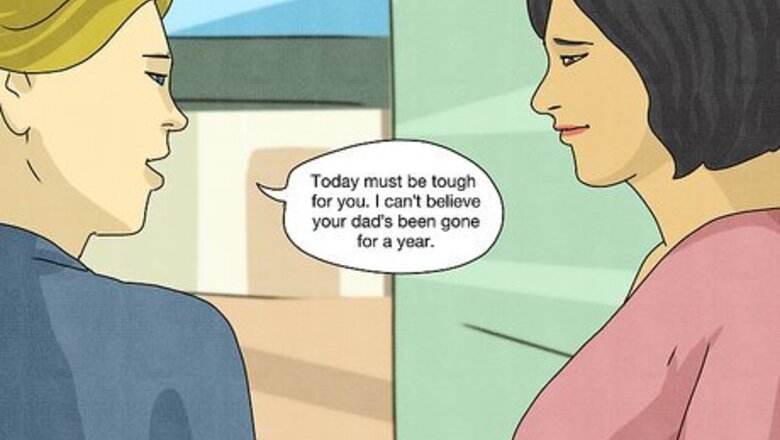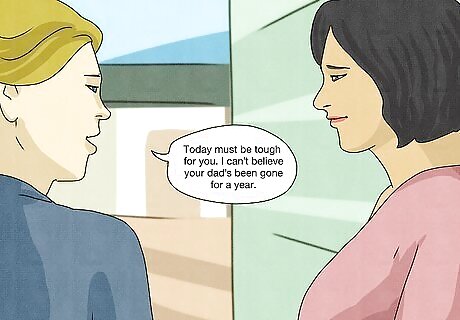
views
- Acknowledge the person's passing and don’t be afraid to say their name. Let your friend or family member know that you’re thinking of them on this day.
- Show your support. Let your loved one know you’re available to them and offer to bring them a meal or take care of a daily task to give them a break.
- Ask how you can honor their loved one’s memory. Also, give them the opportunity to talk about the person who’s passed.
- Avoid passing judgment on how or how long a person grieves. Steer clear of platitudes like “He’s in a better place,” as well.
“Thinking of you on the anniversary of Mia’s passing.”

Acknowledge the anniversary of the person’s death directly. Oftentimes, we’re hesitant to bring up what happened for fear of upsetting the person. The truth is, your friend or family member will likely appreciate that you remember the date and are reaching out to acknowledge what they’re going through. “Today must be tough for you. I can’t believe your dad’s been gone for a year.” “Remembering Jayden on the third anniversary of his death.” “You’re on my mind today.”
“It’s okay to feel whatever you’re feeling.”

Let them know that you support them in their grieving process. Even if it’s been a few years since their loved one passed away, avoid encouraging someone to get over or move past their loss. Reassure them that whatever they’re feeling is okay. “Your grief is normal.” “Grief has no expiration date.” “It’s okay to not be okay.”
“How can I honor Noah today?”

Ask them how they’d like to celebrate their loved one’s memory. Doing something to honor the life of the person they lost often feels supportive on the anniversary of a death. Ask if they have anything in mind or suggest a few ideas of your own. Offer to do something that their loved one enjoyed. “How can I help celebrate Deon’s life?” “Would you mind if I light a candle in remembrance?” “I’d like to make a donation to Wesley’s favorite charity, if that’s okay.”
“Tell me more about Talia.”

Give them the chance to talk about their loved one. Ask about the times they spent together or share your own memories of the person that they lost. Rather than offering advice or platitudes, just sit and listen. You could also share your own memories of the person. Don’t be afraid to say their name, either. “What’s your favorite memory of Viktor?” “I’ll never forget when your mom helped us make that giant cake for Coen’s birthday. It looked like a bakery exploded in your kitchen.” “Aunt Alani would be so proud of you for following in her footsteps. She always knew you’d make a wonderful nurse.”
“Can I bring you lunch or dinner?”

Ask them what you can do to show your support. Your friend or family member might be overwhelmed with day-to-day tasks. Offer to take something off their plate so they can focus on honoring their loved one and processing their emotions. Try to suggest something specific, as people aren’t super likely to reach out after a general “Let me know how I can help” request. “Would it help if I picked up the kids from school?” “Do you mind if drop off some groceries?” “Is there anything I can do to make today easier for you?”
“How are you feeling today?”

Give them a chance to talk about what they’re going through. Anniversaries can bring up all kinds of painful emotions. Voicing them can help your friend or family member process their feelings. Invite them to be open and honest about their experience. Listen without judgment. “Do you want to talk about it?” “What kind of memories have come up for you today?” “How is your experience this year different from years past?”
“I love you.”

Remind them that you care for them. In truth, there’s not much you can say to ease someone else’s grief. But you can let them know how much they mean to you. Offer to just be there with them, if they’d like the company. “I’m always here for you.” “You don’t have to talk. I will sit beside you.” “Do you need a shoulder to cry on?”
“My sincerest sympathies for your loss.”

Reiterate your condolences to acknowledge how grief lasts. Sure, you probably expressed your sympathy when the person died, but their loss lives on in your friend. Let them know that you understand that they’re in pain. “I’m so sorry.” “May peace be with you.” “You’re in my thoughts and prayers.”
"To live in the hearts of those we love is never to die.” – Hazel Gaynor

Offer a quote if you’re at a loss for words. Don’t worry about coming up with the perfect thing to say. It is, after all, the thought that counts. Your friend or loved one will appreciate you reaching out and acknowledging what they’re going through. Feel free to borrow some words from a famous (or even anonymous) author. Just choose something that feels right to you. “Say not in grief that they are gone, but give thanks that they were yours.” — Hebrew Proverb “Unable are the loved to die. For love is immortality.” — Emily Dickinson “Those we love don’t go away, they walk beside us every day. Unseen, unheard, but always near; still loved, still missed and very dear.” – Anonymous




















Comments
0 comment